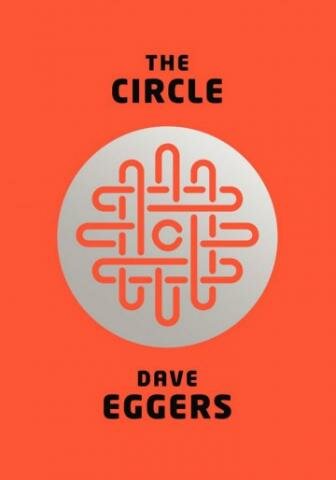
The Circle by Dave Eggers Alfred A. Knopf, McSweeney’s Books | 2013
Dave Eggers’ new novel, “The Circle,” follows 20-something Mae Holland through her first days as a new hire to her increasingly public role at “the most influential company in the world.” By the time Mae steps foot on the company’s 400-acre campus—complete with pristine glass and steel offices, picnic areas, tennis and bocce courts, dorms, parties, a day center and health clinic—the Circle is already well known and admired for having transformed the web by combining social media profiles, payment systems, passwords, email accounts, user names and preferences into one unified system. As described in the novel, the Circle “put all of it, all of every user’s needs and tools, into one pot and invented TruYou—one account, one identity, one password, one payment system, per person…One button for the rest of your life online.”
The Circle’s tools are the best and most dominant, and the company’s reign over data tracking and digital innovation has just begun. They introduce tools like SeeChange, lollipop-sized, wireless, real-time video cameras that can be placed anywhere on the globe, and ChildTrack, microchips that can be embedded in the bones of children. The Circle advocates the wondrous prospects for gathering knowledge, eliminating anonymity, reducing crime and increasing transparency and accountability—all made possible by their advances. But Eggers hints at, and his readers likely will imagine, the darker, more twisted side of those digital innovations.
As she moves up the ranks, Mae overcomes any initial discomfort with the Circle’s Big Brother tendencies and with the accumulating screens on her desk demanding she fulfill her participation, engagement and social networking quotas. She quickly acclimates to the Circle’s culture of information sharing, and like her college friend Annie Allerton, the senior staff member who got her the job, Mae becomes one of the 10,000 “Circlers” who throw themselves into work at the company with disciple-like devotion.
Dismissing a nagging feeling about the scope and ramifications of the Circle’s tools and networks, Mae buys in to the company’s mottos that “all that happens must be known,” “sharing is caring,” “privacy is theft” and “secrets are lies.” As she grows increasingly detached from family and the outside world, she feels most at home on campus. After all, outside the gates of the Circle, “there were homeless people, and there were attendant and assaulting smells, and there were machines that didn’t work, and floors and seats that had not been cleaned, and there was, everywhere, the chaos of an orderless world.” But the Circle works to improve all that, whether it’s through the gamification of shelter allotment, dissembling tornadoes, turning nighttime dreaming into organized thinking or doing things, like counting the sands of the Sahara, on a lark, to see if they could be done. Mae understands the Circle’s projects “as most Circlers did: as a show of strength, and as a demonstration that with the will and ingenuity and economic wherewithal of the Circle, no earthly question would remain unanswered.”
Eventually, Mae becomes the very public face and voice of the Circle—an ambassador-like representative filming and recording every aspect of her day. But when events start to expose the darker side of creating a dome of surveillance and the company unveils its plans to “complete the circle” by making membership mandatory, a colleague questions whether a private company should have the power to control the flow of all information or the ability to track people from cradle to grave. When he implores Mae to consider the implications on democracy, privacy and free will, she’s confronted with a choice to make about the Circle’s true intentions and her power to support or undermine its vision.
Eggers sets the book in the near future, but the world he imagines doesn’t feel that removed from today’s already highly connected, need to be seen and heard culture. His writing makes readers think about technological advances that sound sensible, innovative, harmless on the surface but that might ultimately test the limits of how much can our minds handle, the boundaries between the known and unknown, and our ability to judge what’s balanced, ethical and humane in a digital world.

Add new comment